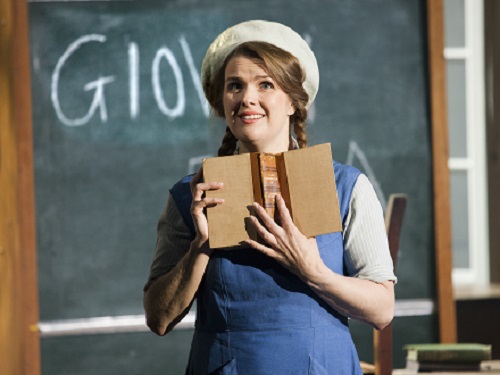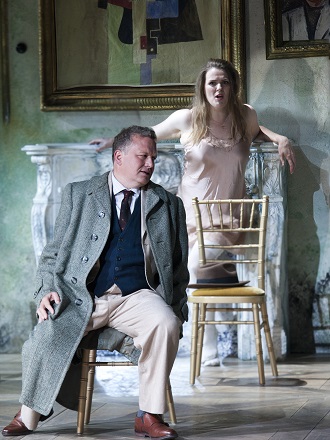Stephen Lawless’ production of Puccini’s Manon Lescaut opened at the Grange Festival on 26 June 2021, the third of this year’s three opera productions all originally planned for 2020. Elin Pritchard was Manon with Peter Auty as Des Grieux, Nicholas Lester as Lescaut and Stephen Richardson as Geronte, plus Kamil Bien, Angharad Lyddon and Stuart Orme. Designs were by Adrian Linford, lighting by Paul Pyant and movement by Lynne Hockney. Francesco Cilluffo conducted with a pre-recorded orchestral contribution from the Bournemouth Symphony Orchestra.
The Grange, with its limited sized pit, took the decision to turn to technology for the orchestra, using a clever new system whereby the pre-recorded orchestral part seems able to follow the conductor’s beat. The result was remarkably successful and whilst it did sound like a recording and certainly does not replace a live orchestra, in the present circumstances it was a viable compromise.
Lawless took an imaginative and intimate view of the opera, concentrating on the four protagonists. The action was moved to the years 1939 to 1943 with each act preceded by black and white film footage (mainly archive with some specially shot scenes). Act One was set in a run-down boys school and the distressed mansion formed the setting for all the acts. The setting gave the excuse for the entrance of Geronte (Stephen Richardson), Lescaut (Nicholas Lester) and Manon (Elin Pritchard) in a stylish period sports car. Though it also meant the male (and some female) chorus members and some principals dressing in shorts. But once this embarrassment was over, the act worked well.
At the beginning and end of the opera we saw the older Des Grieux (Peter Auty) returning to the school as if the whole opera was in his memory. As Lawless points out in an interview in the programme book, Puccini very much presents the opera from Des Grieux’ point of view.

Act Two became an artistic Parisian salon with the 18th century pastiche passages as a piece of modern chic. Richardson’s Geronte, a collaborator himself, betrayed Manon to the occupying German forces Puccini’s music for the opera never seems to quite fit the 18th century setting, so updating the work is quite understandable and this solution was a neat way around the problem of how to get Manon arrested if the setting is not 18th century. Act Three moved us to after the liberation of Paris, there was no transporting to the USA, just a lorry taking the collaborating women away and in Act Four the couple were simply on the run.
Elin Pritchard (last seen here as Nedda in Christopher Luscombe’s production of Leoncavallo’s Pagliacci, which also featured Peter Auty and Nicholas Lester) made a convincingly girlish figure in Act One, both in looks and voice. And throughout, she retained a youthful appeal, but her voice had the admirable ability to be able to open up at the climaxes. This Manon was all things to all men, able to reflect each man’s need. It was clear that her relationship with Nicholas Lester’s Lescaut was far more intimate than fraternal, and you sense that sex was a currency for her. Pritchard also conveyed a lively intelligence and great charm.

At the end, when Peter Auty’s Des Grieux went off in search of water, he never returned. Manon died alone, with the older Des Grieux looking on, remembering. And Pritchard took full advantage of this imaginative touch to give us a finale scene that was touching, heart-wrenching and superbly sung.
Peter Auty’s Des Grieux began with a fine combination of ardour and naivety, so the gusts of passion disturbed the placid nature of his existence. By Act Two he had matured and was reluctant, at first, to return to Manon. Auty sang with remarkable intensity and the result was full-blooded and full-throated, the scenes with Pritchard having moments of soaring power.
Nicholas Lester’s Lescaut was tall, dark, and handsome, and he knew it. He was a chancer on the make, gloriously oily and frankly down-right nasty. He made a fine foil to his sister and ensured that the opera was not simply a duet. Stephen Richardson made Geronte delightfully self-serving and demanding. The epitome of someone who can buy anything. The salon in Act Two was not because culture interested him but because it looked good and having Geronte as a collaborator made complete dramatic sense.
Kamil Bien and Stuart Orme popped up in three roles each, making each one a character. There was something of the pander about both Edmondo (in Act One) and the Dancing Master (in Act Two) who was clearly more than that. Angharad Lyddon popped up as the lead musician in Act Two, in charge of the incredibly stylish madrigal quartet, a wonderful cameo.
The small chorus on stage, supplemented by a group of actors, was hard animating both Acts One and Two as well as making strong contributions to Act Three. In the pit, Francesco Cilluffo convinced us that this was live, the music throbbed and flowed. His view of Puccini is not polite, passion gusted around.
The production was an impressive achievement, creating a coherent whole from what can sometimes seem a rather disparate group of elements. And in the performances of Peter Auty and Elin Pritchard achieving a profound climax.
Robert Hugill
Puccini: Manon Lescaut
Manon – Elin Pritchard, Des Grieux – Peter Auty, Lescaut – Nicholas Lester, Geronte – Stephen Richardson, Edmondo/Dancing Master/Lamplighter – Kamil Bien, Musician – Angharad Lyddon, Landlord/ Sergeant/Captain – Stuart Orme; Director – Stephen Lawless, Conductor – Francesco Cilluffo, Designer – Adrian Linford, Lighting – Paul Pyant, Movement – Lynne Hockney, Projections – Jon Driscoll, Bournemouth Symphony Orchestra
The Grange Festival; Saturday 26th June 2021.
ABOVE: Manon Lescaut at The Grange (c) Simon Annand